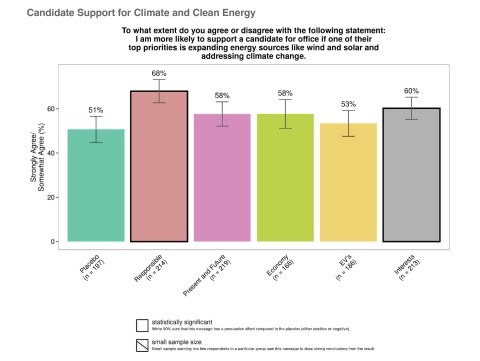Listening to people’s unique interests and priorities is at the core of Conservation Minnesota’s mission. It’s how and why our network of over 75,000 Minnesotans trusts us to provide them with information about conservation issues.
This year we tested a new and innovative way of providing candidates for office information on how to engage voters on conservation issues, particularly clean energy and climate change. In a year where people may have many issue priorities, we wanted to do more than outline conservation priorities, we wanted to ensure candidates that climate and conservation are important to voters.
We hope the details below will be helpful to candidates across the ideological spectrum and in all types of races. This election year is sure to be noisy, and having data rooted in people’s beliefs and motivations can be a game-changer for candidates
Our Research Process
By conducting an online focus group, we were able to gather people’s opinions in their own words, allowing us to uncover what might truly motivate a person to support conservation initiatives. From there, we were able to take their responses and develop messages that would be scientifically proven to make climate a factor in their decision-making tree.
Survey results and candidate recommendations are outlined below:
Step 1: Online Focus Group
- From July 11th to July 19th we conducted an online focus group of 590 Minnesotans.
- We had one overarching question for responders: Are you more likely to support a candidate for office if one of their top priorities is expanding clean energy sources like wind and solar and addressing climate change?
- We followed-up with open-ended questions to try and probe why they answered the overarching question the way they did.
- From there, we collected insights such as people’s top issues, top values, top trusted professionals, top leadership traits among elected officials, and top roles for government.
- Lastly, responders were matched to data sources so we could see demographic information such as age, gender, race, ideology, and urbanicity.
Results
53% of Minnesotans strongly or somewhat agree that they are more likely to support a candidate for office if one of their top priorities is expanding clean energy and addressing climate change. 18% strongly or somewhat disagree and 28% neither agreed or disagreed.
Characteristics of those who strongly agree with the climate statement:
- Top trusted professionals: Teachers, Doctors, Scientists
- Top trusted organizations: Small Business, Police, Democratic Party
- Top trusted leadership traits: Honorable/Integrity, Hardworking, Embraces Diversity
Characteristics of those who somewhat agree with the climate statement:
- Most important issues: Gun Reform, The Economy/Jobs, Crime
- Top trusted professionals: Doctors, Scientists, Nurses
- Top trusted organizations: Small Business, Police, Nonprofits
- Top trusted leadership traits: Hardworking, Effective/Gets Things Done, Honorable/Integrity
Characteristics of those who neither agree or disagree with the climate statement:
- Most important issues: Crime, The Economy, Healthcare
- Top trusted professionals: Doctors, Nurses, Scientists
- Top trusted organizations: Police, Small Business, Military
- Top trusted leadership traits: Effective/Gets Things Done, Hardworking, Honorable/Integrity
Common responses pulled from open-ended questions:
- Strongly Agree:
- Climate change is here, it’s real, and it’s going to impact our children
- We’re seeing it happen live with floods, tornadoes, and droughts
- Leaders need to act now before it’s too late
- Somewhat Agree:
- Climate change is real and needs to be addressed
- Worried about future generations
- While the environment is important, other issues are just as or more important
- Hesitancy in putting all of our energy sources into just renewables
- Neither Agree Nor Disagree
- Climate not a top priority given everything that is happening in the world, but not something they would deny a candidate on
- Many people mentioned they take multiple issues into account
- General apathy towards where our energy resources come from
Step 2: Message Testing
Using the results from the online focus group, our next step was to create a set of messages that could persuade voters to prioritize candidates who support climate and clean energy policies. Nearly 1,200 Minnesotans were divided into six groups. Five of the groups received a message about why candidates should act on climate change, while the last “control group” received a placebo message so we could compare our results to baseline support.
Tested Messages
- “Responsible”
Elected officials should make it a priority to expand energy sources like wind and solar and address climate change. It's common sense and lets me know they are the kind of responsible, courageous, and forward-looking leader that I can trust to make smart decisions for our state and community. - “Present and Future”
When we elect people to office, we expect them to act now and plan for the future. They should work hard at solving the issues of the moment such as inflation and gun violence. But at the same time, they should have the courage to act on climate change by switching to clean energy sources, or else the things we love about Minnesota won't be around for future generations. - “Economy”
With inflation, we've seen our energy and gas prices increase the most. Yet our elected officials have been afraid to take on the oil and gas companies making record profits while our families feel the pinch in our pocketbooks. It'll be great for our economy if politicians act now and switch to cheaper and reliable clean energy sources such as wind and solar. - “EVs”
Historic gas prices are hurting our pocketbooks. It's time for elected officials to make electric vehicles (EVs) accessible and affordable. EV owners enjoy the freedom of not being tied to the gas pump. They pay significantly less for a full tank and often charge at home during off-peak hours. As technology rapidly evolves, new EVs are going farther on a single charge. In addition to the cost benefits of switching, EVs help protect the quality of our air and water. Vehicle emissions pollute the air we breathe with greenhouse gasses and smog. Without tailpipe emissions, electric vehicles will play a big role in protecting our environment for future generations. - “Interests”
Warmer winters are giving us shorter pond hockey and ice fishing seasons. Droughts in the summer are hurting our farmers and causing wildfires in the Boundary Waters. Iconic wildlife like moose and walleye are declining in population. The things Minnesotans enjoy and are most proud of are in danger if elected officials don't act on climate change by transitioning to clean energy.
Results
Like the online focus group, we asked the same question to each message group: Are you more likely to support a candidate for office if one of their top priorities is expanding clean energy sources like wind and solar and addressing climate change? Without seeing any of the messages, 51% of the placebo or control group strongly or somewhat agreed with the statement. This is similar to 53% of focus group responders in test 1.

- For the five test messages, we found significant movement of support in the “Responsible” and “Interests” groups.
- While the winning messages were persuasive to virtually every demographic, we’re also able to dive into subgroups to see if specific messages are more persuasive to certain groups of people:
- “Responsible” was especially persuasive to: low-turnout voters, moderates, suburban voters, 35–54-year-olds, women, and Democrats
- “Interests” was especially persuasive to: suburban voters, those with a college education, parents, Democrats, and women
Recommendations for Candidates
Between the online focus group and subsequent message testing, a majority of Minnesotans are more likely to vote for candidates if they support clean energy and climate change policies, even if they aren’t presented with a message about the issue. If you talk about climate and clean energy in a specific way, you can dramatically increase the likelihood that a voter will support you. You can do this in two ways.
First, lead with your leadership skills. Voters see people taking climate action and investing in clean energy as courageous, forward-thinking, and effective. Second, connect climate change to our everyday interests in Minnesota and how we’re specifically being impacted. It’s easy to talk globally about this issue, but when we use examples about the things we love being in danger, voters begin to visualize specific examples, creating a deeper connection to the issue.
If you would like to dive deeper into the results or look for guidance on messaging practices, email: info@conservationminnesota.org

